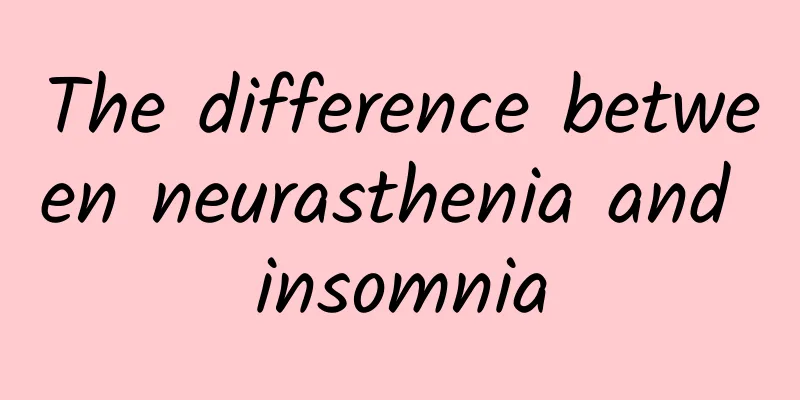The difference between neurasthenia and insomnia

|
Neurasthenia and insomnia are two common diseases. There is a great correlation between them, but there are also certain differences. Neurasthenia often leads to insomnia, and there are many reasons for insomnia. In addition to neurasthenia, there are other causes of the disease. Neurasthenia is relatively harmful to human health. It not only causes insomnia, but also leads to various manifestations such as psychological depression. The difference between neurasthenia and insomnia Some people suffer from insomnia, while others have poor sleeping symptoms and call themselves suffering from neurasthenia. This is a typical case of confusing neurasthenia with insomnia, which is actually wrong. It is reported that 96% of neurasthenia has insomnia factors, but neurasthenia has its own unique characteristics, mainly manifested as mental excitability, fatigue, mental decline and physical fatigue, accompanied by various physical discomforts and sleep disorders, and the course of the disease is often prolonged, with symptoms varying from mild to severe, and each fluctuation in the condition is often related to psychological and social factors. If symptoms such as insomnia, headache, dizziness, memory impairment, and autonomic dysfunction occur, neurasthenia can be considered, but it is necessary to rule out whether it is accompanied by physical illness and mental functional diseases such as early schizophrenia. At the same time, it should be distinguished from depression, because depression also has symptoms of neurasthenia in the early stages, but depression is accompanied by low mood, pessimism, disappointment, loss of interest in various activities, and suicidal attempts or behaviors. Finally, other neuroses must be ruled out before a diagnosis of neurasthenia can be made. Neurasthenia is a symptom of insomnia The main symptoms are difficulty falling asleep and prolonged sleep latency. Patients often feel sleep deprived and have many dreams, and the content of their dreams are mostly nightmares that can be clearly recalled, so patients feel very distressed. It is particularly important to remind you that if neurasthenia is accompanied by persistent insomnia, we should consider that the diagnosis is not neurasthenia, but anxiety, depression, obsessive-compulsive disorder or endogenous depression. Almost all patients with neurasthenia suffer from insomnia to varying degrees, but insomnia is not only seen in patients with neurasthenia, other physical diseases can also cause insomnia. In addition, there is a condition called "habitual insomnia" or "simple insomnia", which is manifested as insomnia that has existed for many years, and it is more difficult to fall asleep than ordinary people, or sleeps less than ordinary people, but there are no other abnormalities, and the person is able to perform his or her own studies and work and has good social adaptation. This condition is not pathological and generally does not require treatment. |
<<: Why does intercostal neuralgia occur?
>>: Can mangosteen and eggs be eaten together?
Recommend
Can Pueraria root be eaten raw?
For the Chinese medicinal material Pueraria lobat...
The penis erection is not hard enough
A harmonious sex life helps to enhance the affect...
Can the colon be removed?
With the arrival of summer, many people like to e...
Knowledge and methods of prevention and treatment of brucellosis
Maybe we all have some knowledge about the preven...
Arm meridian pain
Meridians are a very important concept in traditi...
Is there a difference between pelvic inflammatory disease and pelvic effusion? How to treat it?
Is there any difference between pelvic inflammato...
Is circumcision painful?
Many male friends undergo circumcision surgery fo...
Causes of chest tightness and shortness of breath at night
If we experience chest tightness and shortness of...
Is it better to have long hair or short hair for hair loss?
When hair loss occurs, many people think that sha...
Difference between Hashimoto's disease and hypothyroidism
Hashimoto's disease and hypothyroidism are tw...
Treatment of liver cysts
Liver cyst is a common benign liver disease, whic...
How to prevent neonatal hemolytic disease?
The arrival of every baby is something worth cele...
Pain below the belly button
Pain below the navel is generally caused by abdom...
Can I take a shower before vaccination?
Vaccination is what we call injections in spoken ...
The tooth is broken and half rotten. The nerve hurts when I lick it.
Some doctors are afraid that fillings will affect...









